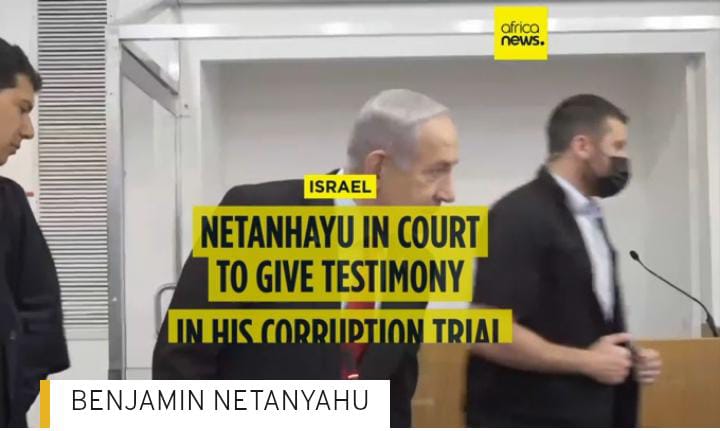Israel’s Prime Minister, Benjamin Netanyahu, appeared in court in Tel Aviv on Wednesday to testify in his long-running corruption trial.
Diaspora Digital Media (DDM) reports that Netanyahu’s legal troubles continue to dominate headlines as he fights to clear his name from multiple charges filed in 2019.
The Prime Minister is facing three criminal cases, including allegations of bribery, fraud, and breach of trust, charges he strongly denies.
The landmark trial, which began in 2020, marks the first time an Israeli sitting Prime Minister has taken the stand as a defendant in a criminal case.
Legal analysts say that if found guilty, Netanyahu could be sentenced to a maximum of ten years in prison.
Despite the seriousness of the charges, Israeli law permits a sitting Prime Minister to remain in office until a final conviction is upheld.
This means Netanyahu can continue governing even if convicted, provided he lodges an appeal.
Netanyahu has continuously claimed that the charges are politically motivated and part of a broader campaign by the media and judiciary to remove him from power.
He insists that the legal process is rigged against him and accuses prosecutors of conspiring with opponents to undermine his leadership.
Prior to Israel’s recent war in Gaza, Netanyahu’s corruption cases were a source of deep national division and political instability.
The controversies surrounding his legal troubles triggered five elections within four years, as Israelis remained sharply split over his leadership.
Following his resounding electoral win in 2022, Netanyahu formed a far-right coalition government, raising fears among critics about the erosion of democratic norms.
One of his government’s most controversial moves was a push to reduce the power of Israel’s judiciary, a plan widely viewed as connected to his personal legal woes.
Mass protests erupted across Israel in response to the proposed judicial overhaul, drawing hundreds of thousands of demonstrators.
Despite public outcry, Netanyahu’s coalition initially pressed on with the reforms, which opponents warned could weaken the rule of law.
Netanyahu repeatedly denied that the legal reforms had anything to do with his personal corruption trial.
He maintained that the changes were necessary to restore balance between the branches of government and curb judicial overreach.
However, since the outbreak of the war in Gaza, Netanyahu appears to have set aside the controversial plan.
The war has shifted national focus and provided Netanyahu with a new platform to rally political support.
Observers note that while the judicial reform agenda is now dormant, Netanyahu’s corruption trial presses on, posing continued challenges for his administration.
The charges stem from alleged attempts to trade political favors and regulatory benefits in exchange for favorable media coverage and luxury gifts.
In one case, Netanyahu is accused of receiving expensive items including cigars, champagne, and jewelry from wealthy businessmen.
Another case alleges he promoted regulatory benefits to a telecommunications giant in exchange for positive news coverage.
The third case involves suspected manipulation of media outlets to influence public opinion and discredit rivals.
Prosecutors argue that these actions amounted to a blatant abuse of power and a violation of public trust.
Netanyahu’s legal team argues that such interactions were standard political practices and do not constitute criminal conduct.
They claim the charges lack merit and are based on flawed interpretations of law and politics.
As the trial progresses, the case continues to polarize Israeli society and keep Netanyahu’s leadership under intense scrutiny.
Analysts suggest that the outcome of the trial could reshape Israel’s political landscape for years to come.
Meanwhile, Netanyahu remains defiant, asserting his innocence and portraying himself as the victim of a political vendetta.
Supporters see him as a seasoned leader unfairly targeted by elites who fear his populist appeal and long-standing influence.
Critics, however, believe the trial is a long-overdue reckoning and a crucial test of the integrity of Israel’s democracy.
With no end in sight, the trial remains a dramatic subplot to the broader challenges facing the Israeli government amid war, economic uncertainty, and internal divisions.
Diaspora Digital Media (DDM) will continue monitoring developments in this high-stakes legal battle that holds significant implications for Israel’s future leadership and the rule of law.







